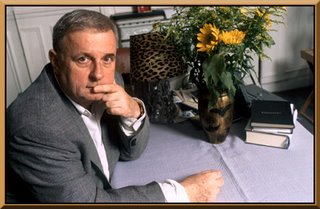
A couple of evenings ago, I went with a friend to hear Edmund White in a public interview at the New York Public Library. By all accounts, White was on the nervous side before the event, partly because his interrogator, Paul Holdengräber, is known for his slightly bizarre and extremely needly style of interviewing.
Holdengräber is the new director of Public Programming at the NYPL, brought in to try and rescue the library's series of talks and readings from oblivion and to seduce a younger, more fashionable crowd. Not, you understand, that he's particularly young or fashionable himself - he's simply noisy. On the evidence of what I heard the other night, he sets out to unsettle and to undermine his interview subjects until they bend helplessly and entirely to his bidding - which seems to be to make himself look as clever, as well-read, as impressively-connected and as dashingly witty as possible. The guy is quite a piece of work. I didn't attend his last interview, with the pianist Alfred Brendel, but apparently he chose to begin by asking Brendel for his favourite joke, and when Brendel was a bit stumped (understandably, given that he, not to mention the audience, expected a discussion of his interpretations of Beethoven, Mozart, etc, over the course of the last 55 years), Holdengräber jumped straight in and spent several minutes regaling everyone present with his own favourite joke. Which I don't remember being told, but I'm sure it included references to Sartre and Camus and how very much they enjoyed Holdengräber's company. (continued...)
Oh, I shouldn't rant. Edmund White was more than able for his interviewer's bad behaviour the other night. In fact, he met it with such honesty and charm that the event proved a much better showcase for White's best qualities as a writer and as a speaker than Holdengräber must have intended. Because, from the beginning, Holdengräber was on the attack. The subject was White's most recent book My Lives, a memoir exploring his experience as a gay man in modern America. In her reviewof the book in the NYT Book Review last weekend, Laura Miller points out that the subjects with which White decides notto address in My Livesare arguably more interesting than those with which he doea deal. For example, there is hardly any mention of his lover who died of AIDS in the mid-90s, or of his own HIV diagnosis in 1985 (he has remained healthy since then, and only began to take HIV medication last summer), or of his role as a founder of the Gay Men's Health Crisis, or his writing about homosexuality, or his (nonmonogamous) relationship of the past 10 years. White's reasons for obtuseness on these counts are certainly to be wondered about - which is precisely the opportunity afforded by a public interview. That, and the opportunity to ask the author to talk, in his inimitable way, about the subjects on which the book itself might disappoint. When the chance finally came for audience members to take the floor, such questions were put to White - but Holdengräber had taken up so much of the assigned time with his excruciating combination of preening and prurience that there were only a few minutes for this more interesting discussion.
Holdengräber was fuelled, in his question, by a barely-disguised fascination with the explicit passages in White's book - that is, those passages in which he leaves no part of his sex life to the imagination - and beneath that fascination could be sensed, in turn, a poorly-controlled sense of fear or repulsion on Holdengräber's part. Throughout, he acted as though he felt supremely justified in trying to make White feel as uncomfortable, as embarrassed, perhaps even as ashamed, as possible where the contents of his own book were concerned. He constantly alluded to how shocked and how "educated" he was by White's descriptions of gay sex. He barked at him to read passages, and when they turned out not to be sufficiently scandalous passages, he barked at him to find others. White, for a time, looked like a schoolboy being chastised in the office of the principal. It was hard not to sense an undertone, in Holdengräber's line of questioning, which went something like this: What were you thinking, actually admitting to this stuff, you filthy old queer? And of course, there were the inevitable assertions of his own heterosexuality, delivered at intervals between his name-dropping of intellectual acquaintances and his pointless forays into French. He looked, onstage, like a young John McEnroe in the midst of a tantrum so violent that it deluded him into believing he was, in fact, the dead French philosopher Maurice Merleau-Ponty.
Anyway, White was a hugely enjoyable speaker, when he managed to get a word in edgeways. He talked about his sister, who had a very difficult coming out after years of life as a wife and a mother of three, and about knowing Foucault towards the end of his life (this wasn't name-droppy at all, but it sent the interviewer off into a frenzy of talk about the french intellectuals he knew...see above). He talked about how Foucault had no idea that he was dying of AIDS until about three months before his death in 1984. He talked also about the reasons why he (White) doesn't keep any sort of journal (a combination, he said, of sheer laziness and of a belief that some degree of forgetting is necessary to the craft of fiction). He talked about why he didn't write about some people, about some losses; once you write things, he said, you lose them, in a way. Emotion can lose its immediacy, become blunted or, worse, polished. So he resists writing about some things, and maybe never puts them into print. It was very interesting. And when he talked about his own experience of being diagnosed with HIV in the 1980s, he was both moving and hilarious. Every arts-related television and radio programme in Europe and America had him on as "the dying author" Edmund White, and he had to face constant blunt questions of the "what does it feel like to have months to live?" variety. In the fact that some of the people who asked those questions are now themselves dead, while White is still in rude good health despite being positive, there was a rich irony, but he didn't exploit it. Despite the bombast of his writing, he's too good-natured for that. If you ever get the chance to see him in person, grab it. Regardless of how you feel about his writing (I find it generally very good - he's currently at work on a novel about Stephen Crane and his infatuation with male prostitutes), the man himself won't disappoint.
Friday, April 14, 2006
Nine Lives
Posted by
hesitant hack
at
1:26 PM
![]()
Subscribe to:
Post Comments (Atom)

1 comment:
Heavens, that Goldengraber chap sounds so bad he's entertaining. Which is more than I can say for my own worst author-reading experience, Gore Vidal at the Berlin Literary Festival. Vidal had been scheduled to read from his new book while a simultaneous translation for those who needed it was broadcast to the headphones supplied in each seat. When we took our places, however, the festival director came out and announced (auf Deutsch) that instead, a German actor was going to read from Vidal's novel Julian. In German. We sat there for two very long hours while Vidal sat on the stage in a wheelchair and the actor read aloud. Despite studying German at university for four years, I struggled to keep up with the reading, and it was one of the most painfully boring experiences of my life. At the very end Vidal stood up, the audience applauded wildly (why?), he said "thanks" and that was it. Very odd, and very, very, very boring.
Post a Comment